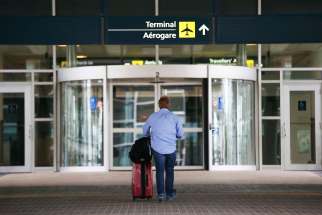Bearing down at the border With travel to U.S. banned, businesses in Emerson making bold decisions
Read this article for free:
or
Already have an account? Log in here »
To continue reading, please subscribe:
Monthly Digital Subscription
$0 for the first 4 weeks*
- Enjoy unlimited reading on winnipegfreepress.com
- Read the E-Edition, our digital replica newspaper
- Access News Break, our award-winning app
- Play interactive puzzles
*No charge for 4 weeks then price increases to the regular rate of $19.00 plus GST every four weeks. Offer available to new and qualified returning subscribers only. Cancel any time.
Monthly Digital Subscription
$4.75/week*
- Enjoy unlimited reading on winnipegfreepress.com
- Read the E-Edition, our digital replica newspaper
- Access News Break, our award-winning app
- Play interactive puzzles
*Billed as $19 plus GST every four weeks. Cancel any time.
To continue reading, please subscribe:
Add Free Press access to your Brandon Sun subscription for only an additional
$1 for the first 4 weeks*
*Your next subscription payment will increase by $1.00 and you will be charged $16.99 plus GST for four weeks. After four weeks, your payment will increase to $23.99 plus GST every four weeks.
Read unlimited articles for free today:
or
Already have an account? Log in here »
Hey there, time traveller!
This article was published 29/01/2021 (1774 days ago), so information in it may no longer be current.
EMERSON — An hour’s drive from Winnipeg and a stone’s throw from the squat concrete monolith marking the line between Emerson and Pembina, N.D. is Canada’s oldest duty-free store.
The family owned business has sold liquor, tobacco, perfumes, cosmetics and Canadiana to cross-border travellers since 1982.
Simon Resch, owner of the Emerson Duty Free, surveys the slow trickle of commercial trucks moving through the Pembina-Emerson border crossing on an icy, bright morning.
Before the pandemic, that traffic would stretch halfway to Letellier, about 20 kilometres north, flanked by long lines of leisure travellers crossing into the United States.
But things are very different now; COVID-19 restrictions mean things at one of the busiest land border crossings in the country has slowed to a dribble. Apart from a few trucks, Highway 75 is otherwise empty.
“The craziest thing for me about all this is that the Canada-U.S. border can actually close, and that it’s been closed for as long as it has been,” Resch says in his store’s quiet back office.
“We never ever would have expected that.”
Before last spring’s lockdown, Resch and his team at the store would serve “a good mix” of commercial drivers, Canadian Border Services agents and leisure travellers. Now the normally bustling warehouse and sales floor are silent. The only people opening the door now are truck drivers exempt from border-crossing quarantine restrictions.
“Now what we see is nothing but trucks on the highway, nothing but trucks coming in,” Resch says.
Truck drivers are not allowed to buy alcohol on their way into the States, he says, and with retail restrictions in place for many months, things such as fragrances and cosmetics couldn’t be sold in person.
“What it means is that there’s one category that we’ve always had at duty-free that’s available for commercial drivers, and that’s tobacco — that’s effectively what the last year has been for us: we’ve become a discount smoke shop,” he says.
As a result, Emerson Duty Free will likely make only 10 to 15 per cent of its usual revenue for this time of year.
To compensate, Resch has applied for every available federal business support, including substantial wage programs to keep his 18 employees — largely youths from the community — on the payroll.
In the 10 months since the border closed to non-essential travel in late March, the store has achieved a somewhat precarious sense of stability: federal supports and Resch’s personal investment (he gave up his 2020 salary to support the business) have kept the lights on.
“We aren’t losing piles of cash and we aren’t losing co-workers,” he says. “We’re also not making any money.”
With huge financial losses staring him in the face, Resch has worked to keep spirits high by reimagining what duty-free can be.
“The situation here in the last nine, 10 months has given us an opportunity to really pull our operation apart from the inside out, take a look at the things we would maybe like to change, and couple that to the need for change presented by COVID,” he says.
Before taking over the store from his father in 2014, Resch worked for several years as a chef in Winnipeg.
He plans to install a Subway outlet and a coffee shop (hopefully a Starbucks, he says with crossed fingers) on the sales floor — along with a wood-fired pizza oven and grill.
Staff have connections to an organic garden nearby, which he plans to use to feed a unique food-service operation.
“It really does provide some big opportunities for us,” he says. “A domestic food and beverage market, from our perspective, means we can operate with or without COVID.”
He leads employees around the sales floor every day, rejigging existing displays to visualize where new food options and other services might be located. A room once dedicated to wine sales has been cleared out entirely in anticipation of the changes. In the back of the store, inventory has been pushed out of sight, giving staff an idea where kitchen equipment — fridges, freezers and ovens — is going to sit.
“There’s going to be some concern, some anxiety — I get where that comes from,” he says.
“I don’t feel that, and I haven’t yet. I’ve been impacted by COVID like everybody else, but I don’t have that sense of anxiety. For me there’s some exciting opportunities, and that is crucially important.”
Not far away, Runnin’ Red — a brokerage and parcel transport company — has seen the border restrictions work in its favour.
The once-modest operation, opened by Emerson residents Trevor Froese and Jeff French in 2015 and run out of a small and crowded building on the west side of the Red River, has grown exponentially in the last year.
“We’ve had a lot more customers getting stuff picked up from Pembina because they can’t cross the border, lots of e-commerce businesses shipping things to the U.S.” says Froese, surrounded by tall stacks of customs paperwork in his office.
“Business has picked up, probably, about six times what the normal volume is.”
Runnin’ Red has kept busy offering parcel pickups and dropoffs, navigating customs and brokerage fees and preparing packages for Canadian retailers looking to sell goods with Amazon.
“As soon as the borders closed in March last year, all of a sudden everything went crazy. We’ve had to upgrade our phone systems, our marketing; we’ve had to hire staff,” Froese says.
The company hired a dozen new employees last year, secured larger warehouse space in Winnipeg, bought a new five-ton truck and is now preparing to move its operational hub to a larger building.
“At first we weren’t sure what was going to happen with cross-border trade, so we actually ended up laying off a couple people and then hired them back within a month — it was something we didn’t see coming,” Froese says.
Though the company is working through some growing pains, Froese says he’s hopeful the business will retain at least half its new customer base and momentum when the border reopens.
With the curtain drawn over the United States, the municipality’s reeve says many locals have turned inwards, finding outlets for shopping, recreation and outdoor fun within the community.
“Border towns, you’re used to being able to say, ‘Hey, I’m just going to zip across the lines,” Emerson-Franklin Reeve David Carlson says.
“There are people in the area who do have family across the border… it is a social outlet, too. People go camping across the lines or they go to Grand Forks or Fargo, go golfing (about 45 kilometres east of Emerson) in Lancaster, Minn.”
Carlson says that while communities on the American side of the border have long been part of the Emerson-Franklin way of life, the pandemic has pushed the community to appreciate what they have at home.
“I think people have realized how their community is special to them,” he says during a chat at the Emerson Fire Hall.
As in many parts of Manitoba, Emerson residents have relied on long walks, river and creek skating rinks and outdoor sports to stay active and entertained.
Some have travelled east to Buffalo Point on Lake of the Woods for excursions while others have set up campgrounds within the municipality limits, he says.
Things typically ramp up in Emerson in the summer when Americans visit on camping trips and RV stops and check out historic locations such as the courthouse, take in festivals and other activities, he says.
With the diminished opportunity for travel outside the province and a new emphasis on an “explore Manitoba” brand of local tourism, Carlson says more visitors have come from within the province.
“We made out better in that regard because people in Winnipeg and elsewhere are looking for things to do,” he says.
Emerson’s hockey and curling rinks — normally winter beehives of activity — have been closed since the province imposed code-red public-health orders, slamming the brakes on much of community life.
Seniors’ programming has dried up, forcing older residents to connect via online meetings or phone.
“We try, because people live in more remote circumstances, to make sure that they get that touch or phone call,” Carlson says.
In his view, Emerson has been lucky; COVID cases have been few and far between. As residents do their best to stay close to home and maintain physical distance from one another, Carlson says the tight-knit community atmosphere has helped to keep spirits strong through a particularly difficult year.
“What’s fortunate here is that most people know each other, and people are family — even just walking down the street you stop and talk,” he says.
“You know people, you can see them, you know your neighbours… and that makes a difference.”
julia-simone.rutgers@freepress.mb.ca
Twitter: @jsrutgers

Julia-Simone Rutgers is a climate reporter with a focus on environmental issues in Manitoba. Her position is part of a three-year partnership between the Winnipeg Free Press and The Narwhal, funded by the Winnipeg Foundation.
Our newsroom depends on a growing audience of readers to power our journalism. If you are not a paid reader, please consider becoming a subscriber.
Our newsroom depends on its audience of readers to power our journalism. Thank you for your support.
History
Updated on Friday, January 29, 2021 9:11 PM CST: Adds placeline









